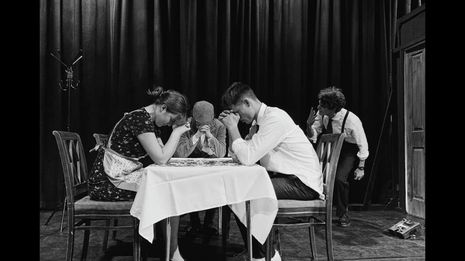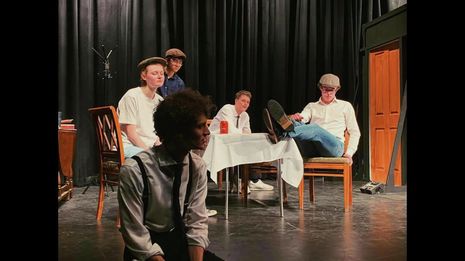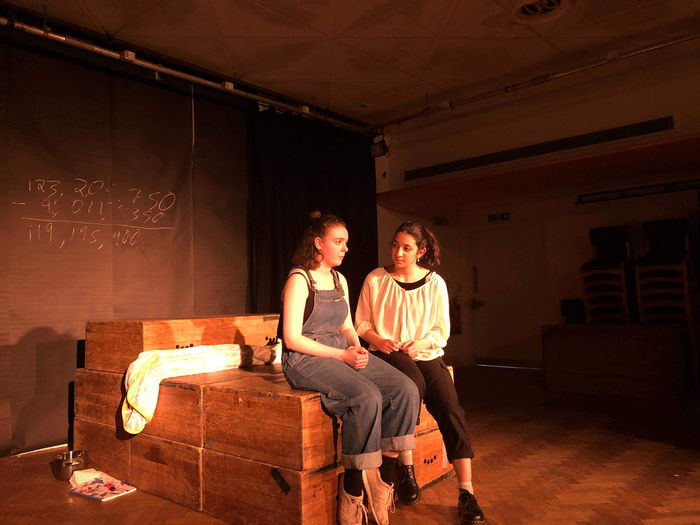Philadelphia, Here I Come! is a staging of internal turmoil that would make Freud proud
Jenny Hay is thoroughly impressed and entertained by this performance of Philadelphia, even though it could have done with more clarity at times

Philadelphia, Here I Come! was originally written in 1964 by Irish playwright Brian Friel, and takes place the night before its central character, Gar, leaves his village of Ballybeg forever in favour of Philadelphia. The central conceit of the show is that it features two actors playing two versions of Gar – Public (Will Leckie) and Private (Tom Hilton) – allowing us to see the internal monologue of the character even while he struggles to communicate his thoughts and feelings to those around him.
Leckie and Hilton are flawlessly cast, bouncing off each other with fantastic chemistry
The most striking thing about this production of Philadelphia, in Robinson College Auditorium, was the performances. Leckie and Hilton are flawlessly cast, bouncing off each other with fantastic chemistry. Of the two, Hilton got far, far more lines, and delivered them all with great energy – juxtaposed with Leckie’s more silent, subdued public face. Both actors managed to transcend the simple labelling of “the loud brash one” and “the quiet repressed one” and instead drew out a range of subtlety and nuance in their characters, making the fact that they are two sides of the same person instantly believable. Maddie Lynes as Madge didn’t have a huge amount of character depth (something I attribute more to the material than her performance), but she played the role very convincingly and always made her presence on stage felt. Daniel Quigley and James Culhane had far smaller roles, but I hugely enjoyed them both. They brought a kind of suppressed understatement to their characters, which absolutely fitted the stifling provincialism of Ballybeg.

The accents were at times… questionable, but I don’t see this as something that should be particularly held against the production. What I will pick up on, however, is the diction and clarity of speech, which was really lacking in some lines. Quigley and Culhane were very clear, possibly because they were performing in their native accents. But there were too many lines from other characters that I completely missed, which had the effect of being quite confusing initially, and also of making a couple of scenes drag unnecessarily because I could barely make out what was being said (one scene involving American accents suffered from this to a unique degree). However, I do want to make it clear that this didn’t hurt the show substantially, and it may well even be something that improves on subsequent nights.
This is high-tier Cambridge theatre that deserves to be seen
The set made good use of Robinson’s performing space, splitting it halfway into a table area and a bedroom, separated by a door. Care was clearly taken to ensure that all members of the audience could see all areas of the stage – a real issue when constructing a wall in the middle. The costumes were simple but effective, as were the lighting and sound. The sound in particular was very minimalistic, only featuring diegetic music, but rather than this detracting from the show it added to its atmosphere.
Where Philadelphia really shone was when it was able to draw out the themes of resentment, disconnection, and longing that underlie the play. Such themes were often best expressed in the quiet moments, in the pauses, and I commend the cast for being willing to savour these long seconds instead of rushing onto the next line of dialogue. The only exception to this was the very end, which seemed to come rather out of the blue – and I’m not sure whether this was unintentional, or a deliberate stylistic choice. Perhaps slowing the pace in the final few lines would have made the end feel less abrupt and surprising.
Overall, this production absolutely and memorably succeeded in both telling the story and bringing out the themes of Philadelphia, and at times even crafted moments of genuine, captivating tension and pathos. Don’t let the fact that the show isn’t at the ADC or Corpus put you off – this is high-tier Cambridge theatre that deserves to be seen.
 News / Uni Scout and Guide Club affirms trans inclusion 12 December 2025
News / Uni Scout and Guide Club affirms trans inclusion 12 December 2025 News / Pembroke to convert listed office building into accom9 December 2025
News / Pembroke to convert listed office building into accom9 December 2025 Features / Searching for community in queer Cambridge10 December 2025
Features / Searching for community in queer Cambridge10 December 2025 News / Uni redundancy consultation ‘falls short of legal duties’, unions say6 December 2025
News / Uni redundancy consultation ‘falls short of legal duties’, unions say6 December 2025 News / Gov declares £31m bus investment for Cambridge8 December 2025
News / Gov declares £31m bus investment for Cambridge8 December 2025









